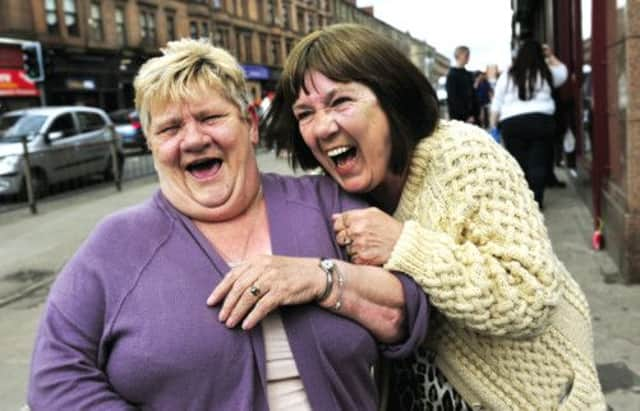Glasgow citizens wellbeing researched in report


The major survey, which compares Scotland’s largest city with Manchester and Liverpool, has suggested some of the social bonds which bind it together are not as close as some might like to think.
On the plus side, Glaswegians do speak to their neighbours more than people do in the two English cities.
Advertisement
Hide AdAdvertisement
Hide AdGlaswegians are also less concerned about neighbourhood problems such as vandalism or antisocial behaviour, despite the caricature of this portrayed by Ian Pattison’s comic creation Rab C Nesbitt, as played by Gregor Fisher in the BBC TV series.
However, the report finds that fewer than one in five in the city agrees that most people in their area could be trusted, below levels found in Liverpool and Manchester.
The report also reveals that Glaswegians were half as likely to do unpaid or voluntary work than Mancunians or Liverpudlians – with the gap in such work even higher among the cities’ well-off professional classes.
The report concludes such low levels of “social capital” could “potentially impact” on Glasgow’s notoriously poor health statistics, following global evidence of a link between stronger social bonds and lower mortality rates.
The paper, Exploring potential reasons for Glasgow’s ‘excess’ mortality by the Glasgow Centre for Population Health, is the first major exercise which puts detailed figures on a series of theories about why the city has such appalling health.
Researchers note that the clear link between deprivation and high mortality is the core reason why Glasgow, and other relatively poorer cities in the UK, such as Liverpool, suffers such bad health. But evidence shows that when compared with Liverpool, premature mortality in Glasgow is still 30 per cent higher. Statistics suggest men in the city are dying a full two years earlier than might be expected from the city’s social profile.
This so-called “Glasgow effect” has baffled experts, with theories ranging from the poor weather to a particular strain of hedonism in the city, to the fact that Glaswegians are less able to cope with stress.
Researchers thus decided to test the theories with a major poll of people in Glasgow, Liverpool and Manchester, three cities with similar social backgrounds, to see if there were any marked differences. Their main finding was that many of the theories about Glasgow’s health problem simply do not have any data to back them up.
Advertisement
Hide AdAdvertisement
Hide AdThere have been claims, for example, that Glasgow’s higher death rates may be due to the city’s low “sense of coherence” – a theory which suggests that if people are unable to make sense of their lives, their health will suffer. But the paper shows Glaswegians had a significantly higher “sense of coherence” than Liverpudlians and Mancunians.
Nor was there evidence to show that city-dwellers suffered particularly poor childhood experiences, or that Glaswegians have a different psychological outlook, or are more hedonistic.
Meanwhile, the report said further research would be required to test whether Glasgow’s health has been affected by higher levels of materialism, or whether the “political attack” of UK policies since the 1980s had had an effect.
But the report concludes it appears “plausible” that some differences in “social capital” could “potentially impact on levels of health and wellbeing in the population”.
Liverpool consistently emerges as the city with the strongest bonds. Manchester has the worst figures in some areas, such as the percentage of people who said they had no-one to turn to for help – 16 per cent in Manchester, against 7 per cent of Glasgow and 4.5 per cent in Liverpool.
Mancunians were also least likely to agree that people in their city shared the same values or tried to help each other out – with Liverpool again scoring highest.
But on “trust”, only 20.5 per cent of people in Glasgow agreed that most people could be trusted, compared with 25 per cent in Manchester and 27 per cent in Liverpool. Only 17 per cent said that “most people in their neighbourhood could be trusted” compared with 23 per cent in Manchester and 27 per cent in Liverpool. Asked a series of real-life questions, 27 per cent of Glaswegians agreed that a lost wallet or purse would be returned intact, a similar number to Manchester (29 per cent), but way below the 40 per cent of Liverpudlians who said it would.
Only 7 per cent of Glaswegians said they had volunteered in the previous year, less than half the equivalent figure for Liverpool (17 per cent) and Manchester (15 per cent). And in the professional A-B social group, only 10 per cent in Glasgow said they had given unpaid help to groups, clubs and organisations, compared with 32 per cent in Liverpool and 31 per cent in Manchester.
Advertisement
Hide AdAdvertisement
Hide AdThere was, perhaps surprisingly, also much lower religious affiliation in Glasgow than in Liverpool and Manchester.
In Glasgow, 46.5 per cent said they had no religious affiliation, compared with 33 per cent in Manchester and 28 per cent in Liverpool. Some research from the US has suggested that higher religious practice also has a beneficial impact on health.
David Walsh, public health programme manager at the Glasgow Centre for Population Health, said: “This isn’t about seeking explanations in place of poverty. It’s about seeking explanation alongside that for why Glasgow is so different.
“Everyone has their pet theory on this. What comes out of the research is the complexity of it all. The important point is that we have been able to collect data for some of these theories which we can now say are unlikely [to be a factor].
“The suggestion that there is a lower sense of coherence seems to be very unlikely. People hypothesised that people in Glasgow had a different set of values; lacked ambition, were more pessimistic or more hedonistic, or just lived for today.
“The answer from this is that there is no evidence.”
Twitter: @EddieBarnes23#
SEE ALSO: